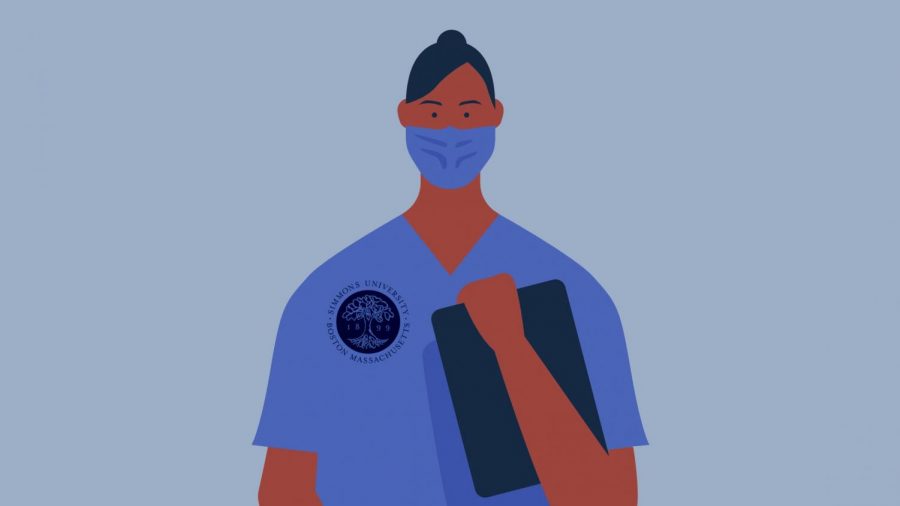Student nurses finish unprecedented clinical rotation
“Ironically, clinical ended up being like the most normal part of this semester.”
December 3, 2020
Nursing students are learning the ropes of their profession during the COVID-19 global pandemic. They are finishing up their clinical rotations just as case numbers spike in the United States.
“Ironically, clinical ended up being like the most normal part of this semester,” said junior Alice Najimy. “Being in a hospital still felt like the same. The only thing different was wearing a mask.”
Clinical rotations were the only coursework Najimy was able to do in-person, as Simmons opted for online classes this semester. She is a nursing student who recently completed her rotations on the gastrointestinal surgery floor at Brigham and Women’s Hospital.
While some nursing students were allowed to live on campus to complete their clinical rotations, Najimy opted to live at home because she thought COVID-campus life would be an isolating and difficult experience. The commute from her home in western Massachusetts was over two and a half hours.
Every Tuesday she and her father would drive from Pittsfield to Boston to stay with Najimy’s aunt who lives in the area. Najimy would do her clinical rotation shifts on Wednesday and Thursday, then take the long drive back home on Thursday night or morning Friday. The necessary commute forced her to take a class on Zoom from her car on Tuesdays.
“The sun would start setting during my class. So I would start the class and full light, and by the end, I was in the dark,” she said. Sometimes, her service would cut out while she was reading documents for class. Najimy said her professor was understanding about her car classroom, and she feels that virtual learning has caused a lot of people to work in unique environments.
Other nursing students felt more stress from the rising cases in their work spaces.
“It was a little nerve wracking for me, because I’m also immunocompromised and so I need to get this in for my degree but also, my immune system is not good,” said Hannah Bishop, a junior who just finished up her clinical rotation at Massachusetts General Hospital on a gynecologic oncology floor.
Bishop has juvenile rheumatoid arthritis (JRA) and takes multiple immunosuppressive medications as a result. She was diagnosed with the autoimmune disorder when she was 12 years old and spent a lot of time in medical care facilities in her youth. It was interacting with the nurses who treated her that made her want to become a nurse in the first place. But now, the disorder that caused her to want to become a nurse is what’s making going to work so stressful.
Because of her JRA, Bishop said she has stayed strict with social isolation throughout the pandemic, and has felt safe despite working in the healthcare system while immunosuppressed. She said she was constantly reassured at the hospital that there were no COVID cases on her floor.
Simmons took measures to mitigate risk of student exposure to COVID-19 at hospitals
“We cannot prevent exposures, but we will not place students on COVID units and make sure that the students have all the PPEs they need,” said Hind Khodr, the manager of clinical education at Simmons.
Students are assigned to clinical rotations by Khodr. Before the semester begins, they fill out a survey, describing which times would work best for them and hospital preference, and Kohdr places students at Boston-area hospitals on floors that correspond with their coursework.
Along with regular requirements students need to complete before starting a clinical rotation, Khodr said some hospitals mandated that students get fitted for protective N95 masks. About 150 students needed to be fit tested for the masks, said Khodr.
She has already begun the process of working with local hospitals to plan clinical rotations for the Spring 2021 semester. She is watching the COVID cases as well, in part because they impact whether the hospitals will allow students to do clinical rotations. All in-person clinicals stopped in March of 2020 due to the surge of COVID cases.
“Students will not start until February, so hopefully by then we will know how the second surge is going to go,” said Khodr. “But so far, the hospitals, they’re letting the students go next semester.”
December 3 saw record-breaking single-day high of COVID-19 cases in Massachusetts. 6,477 people tested positive, according to the Massachusetts Department of Public Health. This broke the previous record of 4,613 new positive cases set the day before.








